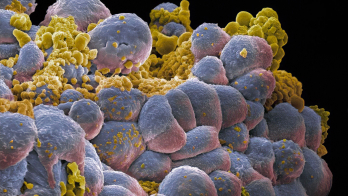
Soon after commissioning with high-energy beams of heavy nuclei, Brookhaven’s Relativistic Heavy Ion Collider (RHIC) tested the second string to its bow when it underwent its first two-week test of transferring, storing, measuring and accelerating polarized (spin-oriented) protons. The run culminated in the acceleration of polarized protons to 32 GeV.
Spin is an intrinsic angular momentum of elementary particles and nuclei. To collect and then accelerate protons where most of the spins are in the same direction requires a special source. Special equipment is also required to keep the protons spinning in the same direction as they are accelerated.
A new polarized proton source was installed for the RHIC experiments, a new device was installed to measure the proton degree of polarization, and a special string of magnets was installed to maintain the polarization through acceleration.
The type of magnet string to control polarization was invented at Novosibirsk, Russia, and therefore dubbed a “Siberian Snake” in the trade. In the Brookhaven test, polarized protons from the new source were accelerated in the Alternating Gradient Synchrotron before being transferred to RHIC.
The new polarimeter measured stable polarization in RHIC at injection and after acceleration. When the Siberian Snake was turned off, no polarization was seen after acceleration.
The ultimate goal is to collide spin-polarized proton beams together next year to yield insight into the spin structure inside the proton. RHIC is the first machine in the world capable of colliding such beams.
In 1995, the Japanese Institute of Physical and Chemical Research, RIKEN, first agreed to provide funding to equip RHIC for work with high-energy spin-polarized protons. This led to the establishment of the RIKEN Research Centre at Brookhaven, a major partner in this work, along with groups from Brookhaven and across the world, including RIKEN and KEK in Japan, ITEP Moscow, Argonne, the Universities of New Mexico and Indiana, and members of the STAR and PHENIX experimental collaborations at RHIC. RIKEN also provided funds for the Siberian Snake and polarimeter.







